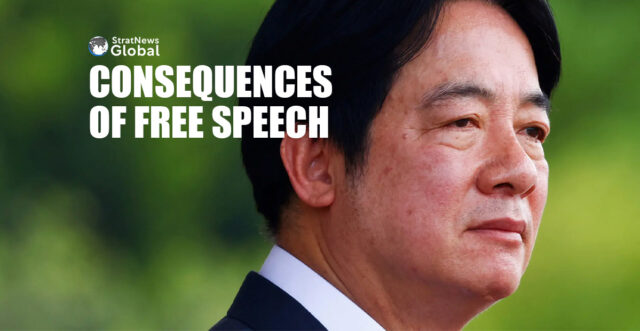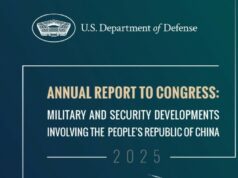China is studying further trade measures against Taiwan two days after slamming a speech of Taiwan President Lai Ching-Te.
Taiwan’s ruling party, has not taken any practical measures to lift “trade restrictions” on mainland China, the commerce ministry stated on its official website.
“At present, relevant departments are studying further measures based on the conclusions of the investigation into trade barriers from Taiwan (against mainland China),” it added.
Lai’s Government Rejects Beijing’s Sovereignty Claims
China, which views democratically governed Taiwan as its own territory, detests Lai as a “separatist”. Lai.
His government reject Beijing’s sovereignty claims, saying only Taiwan’s people can decide their future.
Lai’s Keytnote Speech Angered China
On Thursday at his keynote national day speech, Lai said the PRC had no right to represent Taiwan.
He said the island was willing to work with Beijing to combat challenges like climate change, striking both a firm and conciliatory tone.
The Saturday announcement from China’s commerce ministry could portend tariffs or other forms of economic pressure against the island in the near future.
Lai’s Speech Promoted ” Separatist Ideas”
China’s Taiwan Affairs Office said that Lai’s speech promoted “separatist ideas” and incited confrontation.
It responded to the announcement by saying the fundamental reason behind the trade dispute was the “DPP authorities’ stubborn adherence to the stance of ‘Taiwan independence'”.
“The political basis makes it difficult for cross-Strait trade disputes to be resolved through negotiation,” it added.
China Had Reinstated Tariffs On 134 Items
In May, China reinstated tariffs on 134 items it imports from Taiwan.
It did so after Beijing’s finance ministry said it would suspend concessions on the items under a trade deal because Taiwan had not reciprocated.
The Cross-Strait Economic Cooperation Framework Agreement (ECFA) between China and Taiwan was initially signed in 2010.
Taiwanese officials had previously told Reuters that China was likely to pressure Lai by ending some of the preferential trading terms.
(With inputs from Reuters)
Delhi based journalist pickled in journalism. Have reported from nine world capitals and almost all parts of India. Over the last three decades, I have worked for India’s mainstream English dailies and contributed to All India Radio, Doordarshan and Women’s Feature Service. Also worked for international media including Japan’s leading newspaper, The Asahi Shimbun and done assignments for The Sunday Times, London, The Telegraph, The Guardian and the Canadian Broadcasting Corporation. Worked in the Embassy of France in New Delhi and can speak French to save my life. Write on Diplomacy, Politics and the social sector. Love Nature, heritage, Nature, animals and vintage cars. Enjoy cycling and playing badminton.





